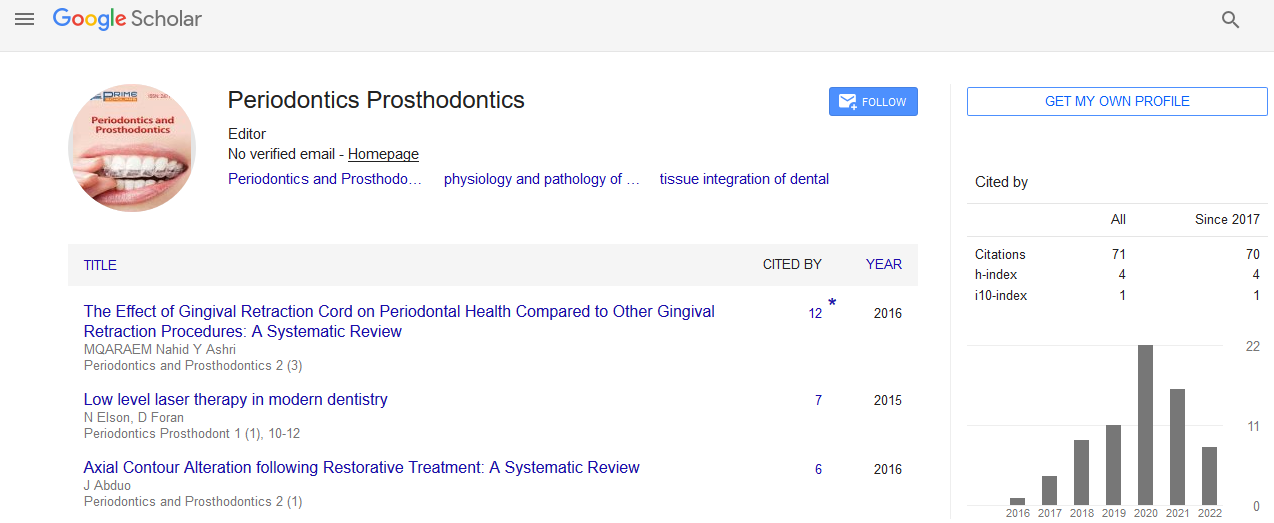Commentary - (2023) Volume 9, Issue 4
Implant Survival in Renal-Transplanted Patients
Claudio Stacchi*
Department of Medicine, University of Trieste, Italy
*Correspondence:
Claudio Stacchi,
Department of Medicine, University of Trieste,
Italy,
Email:
Received: 29-Nov-2023, Manuscript No. IPPDPD-24-19786;
Editor assigned: 01-Dec-2023, Pre QC No. IPPDPD-24-19786;
Reviewed: 15-Dec-2023, QC No. IPPDPD-24-19786;
Revised: 20-Dec-2023, Manuscript No. IPPDPD-24-19786;
Published:
27-Dec-2023, DOI: 10.36648/2471-3082.23.9.31
Description
Dental implants serve as artificial tooth roots, providing a sturdy
foundation for replacement teeth that closely resemble natural
teeth in appearance and function. Unlike traditional tooth
replacement options such as bridges or dentures, which sit on
the gums or rely on adjacent teeth for support, implants are surgically
placed into the jawbone, where they fuse with the bone
through a process called osseointegration. This integration creates
a stable and secure anchor for replacement teeth, allowing
patients to eat, speak, and smile with confidence. The process
of dental implant placement typically involves several stages,
beginning with a comprehensive evaluation to assess the patient’s
oral health, bone density, and treatment goals. If deemed
suitable, the implant placement procedure is performed under
local anesthesia, wherein titanium posts are surgically inserted
into the jawbone. Over the following months, the implants gradually
integrate with the bone, forming a strong and stable foundation
for the final restorations. Once osseointegration is complete,
custom-made crowns, bridges, or dentures are attached
to the implants, restoring function and aesthetics. The benefits
of dental implants are manifold and extend beyond traditional
tooth replacement options. Some of the key advantages include
dental implants provide excellent stability and support, allowing
patients to bite, chew, and speak with confidence. Unlike removable
dentures, which may slip or cause discomfort, implants feel
and function like natural teeth, enabling a more natural eating
experience. Dental implants closely mimic the appearance of
natural teeth, restoring the smile and facial aesthetics. With custom-
designed crowns or bridges, implants blend seamlessly with
existing teeth, enhancing the overall appearance and symmetry
of the smile. Tooth loss can lead to bone resorption and changes
in facial structure over time. Dental implants help preserve bone
density by stimulating bone growth and maintaining the jawbone’s
natural contours. This prevents the sunken appearance
often associated with tooth loss and denture wear. With proper
care and maintenance, dental implants can last a lifetime, making
them a cost-effective investment in long-term oral health. Unlike
bridges or dentures, which may require periodic adjustments or
replacements, implants offer a permanent and reliable solution
for tooth loss. Dental implants not only restore oral function and
aesthetics but also improve overall quality of life. Patients can eat
their favorite foods, speak clearly, and smile confidently, without
worrying about the appearance or stability of their replacement
teeth. The impact of dental implants on individuals and
society is profound, offering a transformative solution for tooth
loss that transcends traditional limitations. Beyond restoring oral
function and aesthetics, dental implants contribute to improved
oral health, enhanced self-esteem, and better overall well-being.
Moreover, by preserving bone health and minimizing the need
for future dental interventions, implants have significant longterm
benefits for patients and healthcare systems alike.
Conclusion
In conclusion, dental implants represent a remarkable advancement
in modern dentistry, providing patients with a permanent
and effective solution for tooth loss. Through meticulous planning,
precision surgery, and customized restorations, dental implants
offer unparalleled functionality, aesthetics, and longevity.
By restoring oral health and confidence, implant dentistry has a
profound impact on individuals’ lives, empowering them to enjoy
life to the fullest.
Acknowledgement
None.
Conflict Of Interest
The author’s declared that they have no conflict of interest.
Citation: Stacchi C (2023) Implant Survival in Renal-transplanted Patients. Periodon Prosthodon. 9:37.
Copyright: © 2023 Stacchi C. This is an open-access article distributed under the terms of the Creative Commons Attribution
License, which permits unrestricted use, distribution, and reproduction in any medium, provided the original author and source
are credited

